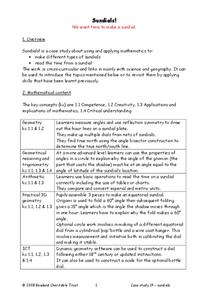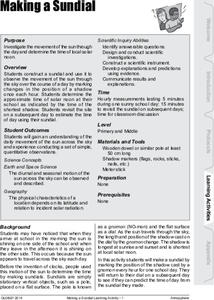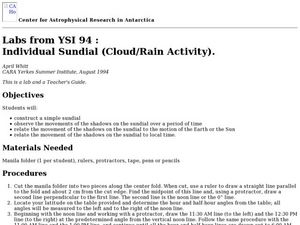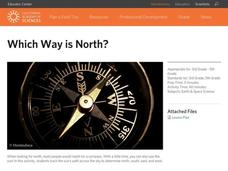Curated OER
Sun and Shadows
Why do shadows look different in the summer than in the winter? What causes day and night? How can a sundial be used to tell time? Answer these questions and more through two engaging lessons about light and shadows. Fourth and fifth...
Space Awareness
Making A Sundial
Can people really measure time just by using the sun? Scholars venture outside on a nice, sunny day to build sundials and learn how people measured time 600 years ago. The class builds two different sundials while gaining practice with...
Curated OER
Just Me and My Shadow
Students take measurements throughout the day using a simple sundial called a gnomon. They record the results on a Data Log and convert from English units to metric (S.I.) units. Data points are plotted on the same graph and analyzed.
Curated OER
Sundials and Shadows - What Can They Teach Us About Seasons?
Students collect and analyze data relating to seasonal changes. They view a video, research web sites and build a sundial to collect their data.
CK-12 Foundation
Pythagorean Theorem to Determine Distance: Tree Shadows
Why is that shadow getting longer? Determine the changes in the length of a shadow as the sun changes position in the sky. Individuals use an interactive to calculate the length of a shadow at different times during the day via the...
CK-12 Foundation
Seasons: Shadow Lengths
Before iPhones and calendars, how did humans determine the seasons of the year? Middle school scientists discover how to use shadows to determine the time of year in an enlightening interactive. Pupils manipulate the sun and examine the...
Bowland
Sundials!
Time to learn about sundials. Scholars see how to build sundials after learning about Earth's rotation and its relation to time. The unit describes several different types of possible sundials, so choose the one that fits your needs — or...
GLOBE Program
Making a Sundial
Sundials are more than just primitive clocks. Learners build their own sundials to study the location of the sun across the sky throughout the day. They use shadow evidence related to their sundials to make conclusions about solar movement.
Curated OER
Seein' Double, Seein' Double
By using the Internet, hands-on activities, video, and cooperative learning, pupils look into the conditions in which light casts shadows on objects. The lesson includes fabulous hands-on activities, art projects, worksheets, and reource...
Curated OER
Individual Sundial (Cloud/Rain Activity)
Students make a simple sundial to examine the changes in shadows over time. In this sundial and shadow lesson, students make a simple sundial out of a manila folder and pencil. They observe how shadows change over time, and relate it to...
Curated OER
Shadow Interlude
Learners explore light and shadow and discover that the sun is the primary source of light. they explore the aspects of light and that the size and shape of a shadow depends on the proximity of the light source and create a sundial.
Curated OER
Making a Sundial
Third graders make a sundial and explain how to use it. They describe the movement of Earth and the moon and the apparent movement of other bodies through the sky. They predict what happens when they put their sundials in the sun.
Curated OER
Using a Sundial
Students examine the use of a sundial to tell apparent time. In this sundial lesson, students watch a teacher demonstration using a flashlight to create shadows. They discuss what happens to shadows of different objects as the position...
California Academy of Science
Which Way is North?
Who needs a compass to find cardinal directions? Just place a stick in the ground and record the movement of its shadow over the course of a day. Then, measure the shadow lengths in order to determine a north-south line. A simple...
Curated OER
Sundials
Students investigate the different types of sundials and their history. For this shadows and time of day lesson students build their own sundials.
Curated OER
Sundials: Keeping Time Like Native Americans
Students explore the use of sundials. They observe the shadows cast by the sun and record the times at various points throughout the day. They create sundials and record the location of the shadows and the time of day. They view a...
Curated OER
Make a Shadow Clock
Learners make shadow clocks. In this earth science instructional activity, students follow the provided steps to make shadow clocks out of the provided pattern and tagboard. A game, a song, a craft, and a recipe are all included with ...
Curated OER
Sundials: Observing and Using Shadows
Students build sundials and observe changes in shadows over the course of one or more days. They identify patterns in the shadows and discuss how shadows may be used to tell time.
Curated OER
Make a Shadow Clock
Learners create a shadow clock. In this time instructional activity, students make their own shadow clock or sundial from tag board. They place it on the ground and check it every hour to mark where the shadow lies.
Curated OER
Portable Sundial
Students work together to identify the accuracy of sundials. They track the position of the sun and create a shadow plot. They discover the difference between real time and clock time.
Curated OER
Time
Students make a sundial. In this time lesson, students determine the time of the day by creating a sundial. They check the time on the sundial, hourly, for one week. Afterward, they explore what happened to the shadows in reference to...
Curated OER
This Is a Stick Up
Students create a sundial and track the movement of the sun throughout the day. Modifications to the lesson are provided for both lower and upper elementary students.
Curated OER
Astronomy with a Stick
Students describe the movement of the Earth as it relates to the sun and
formulate a hypothesis for the movement and the changing length of the shadow. They express the relationship between the sun and the Earth and how that causes the...

























